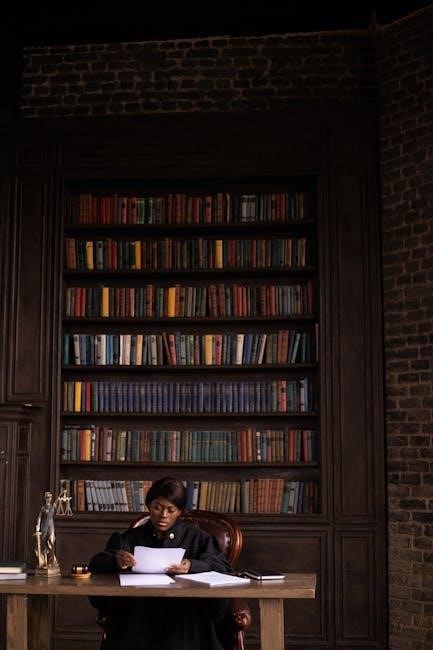Michael Sandel’s Justice: What’s the Right Thing to Do? explores moral dilemmas and philosophical theories, challenging readers to rethink their understanding of fairness and ethics in society.
Overview of Michael Sandel’s Book

In Justice: What’s the Right Thing to Do?, Michael Sandel delves into the complexities of moral reasoning and justice, drawing on the ideas of prominent philosophers like Kant, Mill, and Rawls. The book, based on his renowned Harvard course, explores how justice applies to real-world dilemmas, challenging readers to question their assumptions about fairness and morality. Sandel critiques both liberalism and communitarianism, advocating for a more nuanced understanding of justice rooted in Aristotelian ethics. By blending philosophical theory with everyday examples, Sandel makes complex ideas accessible to a broad audience. His approach emphasizes the importance of engaging with ethical debates in contemporary society, encouraging readers to think critically about how justice shapes individual and collective life. The book has become a cornerstone for understanding moral philosophy in an engaging and thought-provoking manner.
Key Themes in Moral Reasoning
Michael Sandel’s work emphasizes several key themes in moral reasoning, including the tension between utilitarianism and Kantian ethics. He explores how these theories apply to real-world dilemmas, such as distributive justice and individual rights. Sandel also examines the role of virtue ethics, inspired by Aristotle, arguing that justice involves cultivating good character and moral habits. Additionally, he critiques the limitations of liberalism, highlighting the importance of community and shared moral values. Sandel’s approach encourages readers to engage with ethical theories actively, rather than passively accepting them. By discussing contemporary issues like economic inequality and human rights, he illustrates how moral reasoning can inform practical decisions. His work challenges readers to think deeply about the moral principles that guide their actions and the society they inhabit, fostering a deeper understanding of justice in its many forms.

Michael Sandel’s Approach to Justice

Michael Sandel’s approach to justice combines engaging dialogue with real-world examples, encouraging critical thinking about moral dilemmas while challenging conventional views on ethics and fairness.

Utilitarianism and Kantian Ethics

Michael Sandel examines the contrasting principles of utilitarianism and Kantian ethics in his work. Utilitarianism, as championed by John Stuart Mill, emphasizes maximizing overall happiness and minimizing suffering, often leading to morally complex decisions. In contrast, Kantian ethics, inspired by Immanuel Kant, prioritizes moral duties and the inherent worth of individuals, arguing that certain actions are inherently right or wrong regardless of their consequences. Sandel critiques both approaches, highlighting their strengths and limitations in addressing real-world moral dilemmas. By exploring these theories, he challenges readers to consider the ethical frameworks that guide their decisions and the broader implications for society.

Critique of Liberalism and Communitarianism
Michael Sandel offers a nuanced critique of both liberalism and communitarianism in his exploration of justice. He argues that liberalism, with its focus on individual rights and freedoms, often overlooks the importance of community and shared moral values. Sandel contends that this can lead to a society that prioritizes personal interests over the common good. On the other hand, he critiques communitarianism for potentially sacrificing individual rights in favor of communal harmony. Sandel’s Aristotelian perspective emphasizes the need for a balanced approach, one that values both individual dignity and the ethical bonds of community. By examining these ideologies through real-world dilemmas, Sandel challenges readers to rethink their assumptions about justice, rights, and the role of society in shaping moral decisions. His critique highlights the complexities of balancing individual and communal interests in pursuit of a just society.

Major Philosophical Influences
Michael Sandel’s work draws heavily from Immanuel Kant, John Stuart Mill, and John Rawls, blending their ideas with Aristotelian perspectives to shape his unique approach to justice and morality.

Immanuel Kant, John Stuart Mill, and John Rawls
Michael Sandel’s exploration of justice is deeply influenced by the works of Immanuel Kant, John Stuart Mill, and John Rawls. Kant’s emphasis on moral dignity and universal moral laws is central to Sandel’s critique of purely consequentialist ethics. Mill’s utilitarianism, which prioritizes the greatest happiness for the greatest number, is examined alongside Kant’s deontological approach, highlighting their philosophical tensions. Rawls’s theory of justice as fairness, particularly his concept of the original position, is a cornerstone of Sandel’s analysis, as he explores how societal structures can be designed to promote equality and fairness. Sandel’s work engages with these thinkers critically, using their ideas to challenge readers to think deeply about moral reasoning and the principles that underpin just societies. By weaving these philosophical perspectives into his arguments, Sandel creates a rich framework for understanding justice in both theory and practice.
Aristotelian Perspectives in Sandel’s Work
Michael Sandel’s work incorporates Aristotelian ideas, particularly the concept of telos, or the ultimate purpose of human life. Sandel draws on Aristotle’s emphasis on virtue ethics, arguing that justice cannot be understood solely through abstract principles like utility or rights. Instead, he suggests that justice must be rooted in a shared understanding of the common good and the cultivation of moral virtues. Sandel critiques modern liberalism for neglecting the role of community and moral formation in shaping just societies. By invoking Aristotle’s ideas, Sandel challenges readers to consider how justice is tied to the flourishing of individuals within a moral community. This Aristotelian perspective offers a counterpoint to Kantian and utilitarian approaches, enriching Sandel’s analysis of justice and encouraging a more holistic view of ethical decision-making in contemporary society.

Case Studies and Real-World Applications
Michael Sandel applies philosophical theories to real-world scenarios, examining moral dilemmas like murder in extreme circumstances, highlighting the tension between law, ethics, and justice in contemporary society.
Moral Dilemmas in Contemporary Society
Michael Sandel’s work delves into pressing moral dilemmas, such as extreme circumstances involving murder, where the line between law and ethics blurs. He challenges readers to consider whether actions can be justified when survival is at stake. Sandel uses these scenarios to explore broader ethical theories, including utilitarianism and Kantian principles. By examining real-world cases, he illustrates how moral reasoning is shaped by competing values and societal norms. This approach not only engages readers but also encourages them to reflect on their own beliefs about justice and morality. Sandel’s method of combining philosophy with everyday examples makes complex ideas accessible, fostering a deeper understanding of ethical decision-making in modern life.
Law vs. Ethics in Extreme Circumstances
Michael Sandel examines the tension between legal frameworks and ethical principles in extreme situations. He challenges readers to question whether actions taken under duress, such as murder in dire circumstances, can be morally justified. Sandel argues that legal systems often fail to account for the ethical nuances of such cases, leading to conflicts between what is lawful and what is morally right. By analyzing these dilemmas, he highlights the limitations of relying solely on legal codes to determine justice. Sandel’s exploration encourages a deeper consideration of how ethics should guide decision-making, even when the law provides clear directives. This approach fosters a more comprehensive understanding of justice, urging readers to reconcile legal obligations with moral responsibilities in extraordinary situations.
